
Santa Marta whispers stories of ancient civilizations and sun-kissed beaches, a city where the echoes of the past mingle with the vibrant pulse of daily life. Often called Cartagena’s “little sister”, this Caribbean gem has a unique charm of its own. From the colorful heart of its historic center to the breathtaking wilderness of the lush Sierra Nevada mountains, Santa Marta offers a kaleidoscope of unique experiences and adventures.
Between city explorations and ecotourism day trips, you can easily spend a week or more in and around Santa Marta without getting bored. No matter, if you want to learn diving, go hiking in the jungle, discover new culinary delights, relax in an outdoor spa, or practice yoga while enjoying incredible views, there’s something new and exciting to do every single day.
Ready to uncover Santa Marta’s secrets? Here’s a curated list of 18 unforgettable things to do in Santa Marta and its surroundings – for independent travelers who like to explore at their own pace.

Photo by Nicole (Travelhapp): Santa Marta Bay Area
Being one of the oldest cities in South America, Santa Marta, enchants with its beautiful colonial old town and its gorgeous sea promenade. The past is still present in the historic center of Santa Marta with its colorful colonial buildings, little streets and historic statues. The plaza in front of the architectonically impressive Cathedral of Santa Marta is simply beautiful, as is Parque de los Novios a few streets further down.
You can spend a relaxed day in Santa Marta simply strolling through the old town and along the beautiful sea promenade, with occasional breaks for a delicious fresh juice, an aromatic regional coffee or tasty seafood. Check out Ikaro Cafe, a cool coffee shop and vegetarian restaurant close to Parque de los Novios in Santa Marta, great for digital nomads (see Google Maps).
A free walking tour is a great way to learn more about the city’s history and meet other travelers. Check out this top-rated free Santa Marta tour on Civitatis.com*.
Alternatively, there are also (paid, but affordable) bike tours through the historic center* (you can book them on Viator.com, for example).

Photo by Nicole (Travelhapp), Santa Marta Cathedral
South America’s liberator Simón Bolívar spent the last weeks of his life in this gorgeous colonial house in Santa Marta. Today it hosts a museum dedicated to the life of Bolivar. After learning about Colombia’s history in the museum, you can stroll through the tranquil garden with its refreshing fountains and beautiful sculptures.

Photo by Nicole (Travelhapp), Quinta de San Pedro Alejandrino, Santa Marta
Just outside the city area of Santa Marta, you will find the villages Bonda and Massinga, which are great places for hiking. There are several ecological hiking trails between the two villages and around Massinga, most famously the Paso del Mango (Google Maps).
It’s recommended to go with a group and a local guide. You can quite easily organize Paso del Mango tours once you are in Santa Marta

Photo by Nicole (Travelhapp), Paso del Mango, Massinga
This museum lets you dive into the fascinating history and culture of the indigenous Tairona people that lived in the Santa Marta area long before the spanish colonizers arrived. You can learn about their daily life, their spiritual practices, and about their impressive goldsmithing craftsmanship.
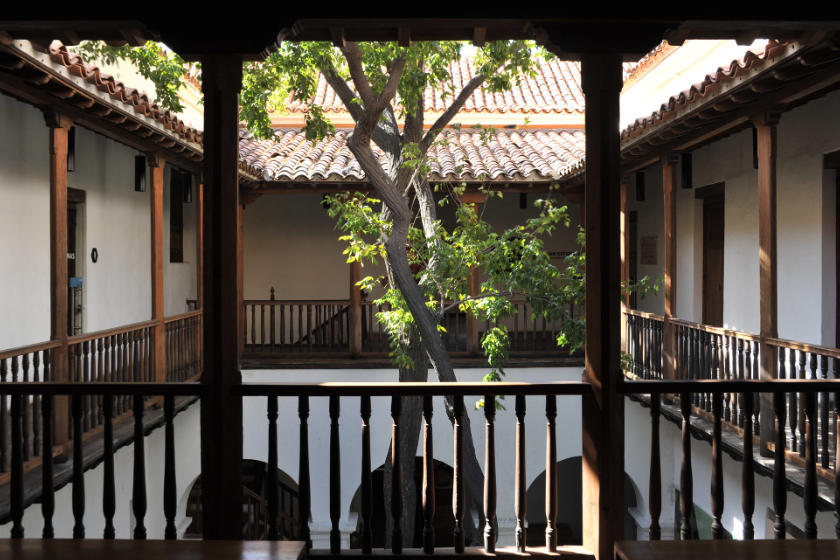
Photo by banrepcultural (CC BY-SA 2.0), Gold Museum Santa Marta (mod.)
Popular local dishes in Santa Marta include fried fish with coconut rice (pescado frito con arroz con coco), seafood stew in coconut sauce (cazuela de mariscos), ceviche, sancocho (a delicious soup) and bollo de mazorca (the Caribbean version of a Tamale).
People from Santa Marta (“samarios”) are crazy about Salchipapa (french fries and a sort of hot dog immersed in loads of sauce). If you are a fast food fan you may give it a try. You can get it all night at food stands throughout the city…
This colorful market sells a great variety of fruit, vegetables, fish, meat, plants and other stuff. It makes an amazing local experience with its hustle and buzzle. Around the market you can find a lot of street food stands. View Mercado Publico de Santa Marta on Google Maps.
Just 15 minutes away from Santa Marta lies Taganga, an idyllic little fishing village and former backpacker favorite. Santa Marta and Taganga are excellent starting points for snorkeling and diving tours by boat, and are among the best places in the world to learn diving because of their excellent cost-benefit ratio. Marine wildlife spotting is a pure pleasure in the warm waters of the Caribbean sea. Many of the dive spots are inside Tayrona National Park.
There are numerous good diving schools in Santa Marta and Taganga. You can book a Discovery Dive for beginners* in Tayrona Park directly through GetYourGuide with Carolina’s dive center. I myself have dived several times with Victor’s Caribbean Pro (Google Maps) and have always felt very well looked after.
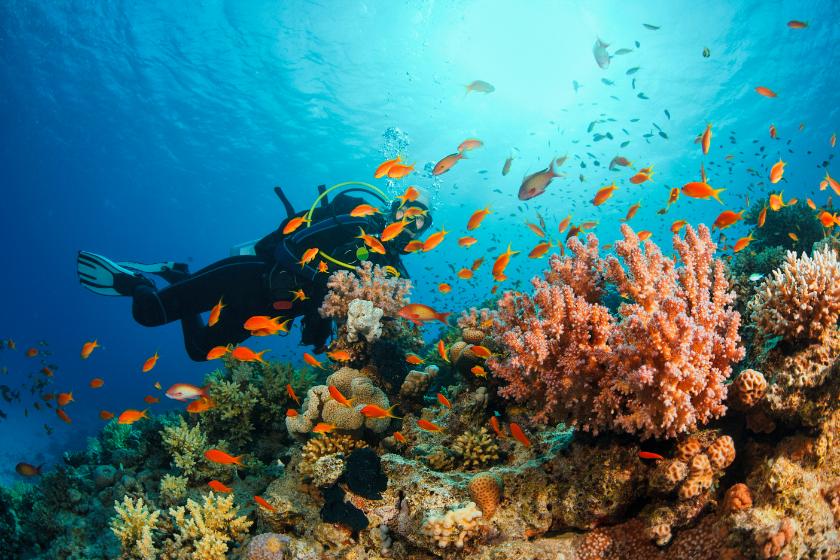
Photo by Ultraminfoto, diving in the Caribbean sea
To find the best beaches in Santa Marta, you have to look beyond the popular options.
Playa Tortuga (near the airport) and Playa Grande (in Taganga) offer a more relaxed vibe compared to the popular and bustling Rodadero Beach. Playa Blanca, a local favorite, is accessible by boat from Rodadero and also provides a quieter experience compared to Rodadero beach or Santa Marta city beach.
However, for the most paradisiacal beaches, head to Tayrona National Park and its surrounding areas. Further north along the coast towards Riohacha lies Playa los Angeles, another hidden treasure abounding with pristine beauty and tranquility.
That being said, Santa Marta’s and Taganga’s main city beaches are still great for taking walks at sunset!

Photo by Nicole (Travelhapp), Santa Marta City Beach
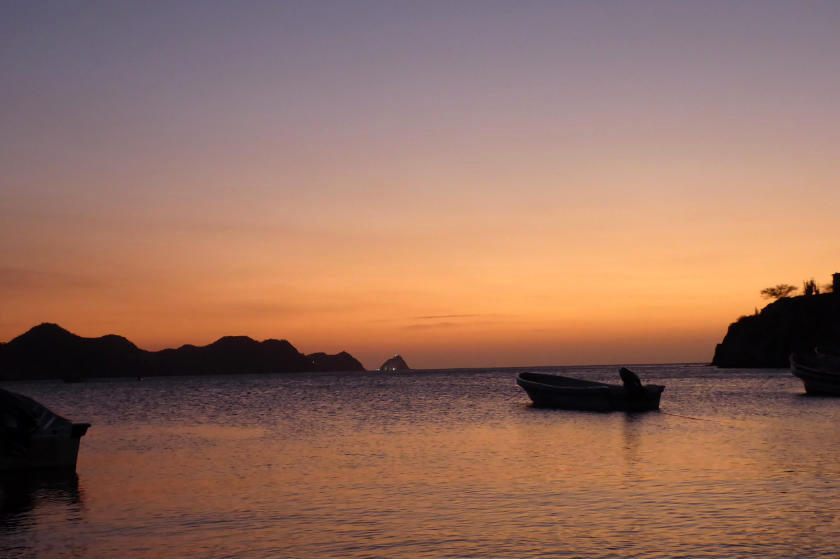
Photo by Nicole (Travelhapp), sunset in Taganga
Colombia is the birdwatching destination for apasionados around the world, since it features the highest bird diversity on the planet. There are specialized local operators in Santa Marta that organize bird watching tours in Minca or Tayrona National Park.
Check out this birdwatching tour in Minca on GetYourGuide.com*.

Photo by Agami Stock, Santa Marta Woodstar bird (mod.)
The following attractions are located in the surroundings of Santa Marta, making ideal day trips or multi-day trips.
Tayrona National Park is one of Colombia’s top attractions and a great destination for solo travelers. You can go hiking in the jungle, engage in wildlife spotting or chill at white sand beaches. Read more and plan your independent trip to Tayrona National Park!
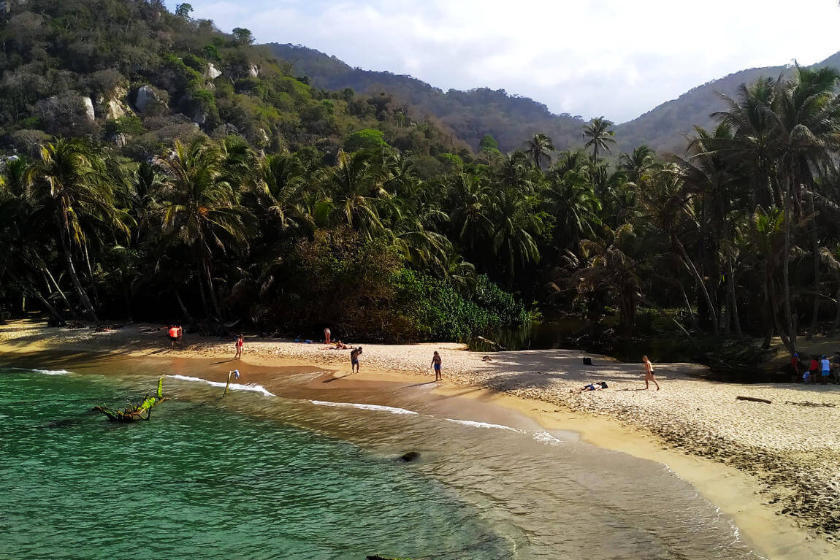
Photo by Nicole (Travelhapp), Tayrona National Park
Ciudad Perdida (“Lost City”) is an abandoned ancient city in the mountains of the Sierra Nevada de Santa Marta, accessible via a challenging 3-5 day jungle trek from Santa Marta. It was built by the Tayona indigenous people in the 9th century, and “abandoned” in the 16th century when the Spanish arrived… Ciudad Perdida is sometimes called the “Machu Picchu of Colombia” and is one of Colombia’s most important and impressive archeological sites.
Check out the top-rated 4-day Lost City Trek (Viator.com*) by a women-owned local operator. They have been doing the trek for more than 15 years and are passionately dedicated to sustainable community tourism. Also have a look at my detailed Lost City tour comparison.

Photo by Datingscout, Ciudad Perdida (mod.)
You can reach Minca in just about 40 min by bus from Santa Marta’s Mercado Publico. This little paradise high up in the Sierra Nevada de Santa Marta mountains enchants with myriads of waterfalls, beautiful hiking trails, spectacular views, and a pleasant climate. You can also find a delicious french bakery and outdoor yoga in peaceful Minca.

Photo by Nicole (Travelhapp), Minca, Hike to Finca San Rafael
The Sierra Nevada de Santa Marta is famous for both its coffee and its chocolate. So, depending on your personal taste and preferences, you may either visit a coffee farm or a cacao plantation (or both) to learn about the production process and do tastings.
Combined tours to coffee and cocoa plantations are also offered in Minca. While I would recommend spending a few days in Minca, if you don’t have much time, there are also day trips from Santa Marta, for example, this lovely coffee & cocoa tour on GetYourGuide.com*.
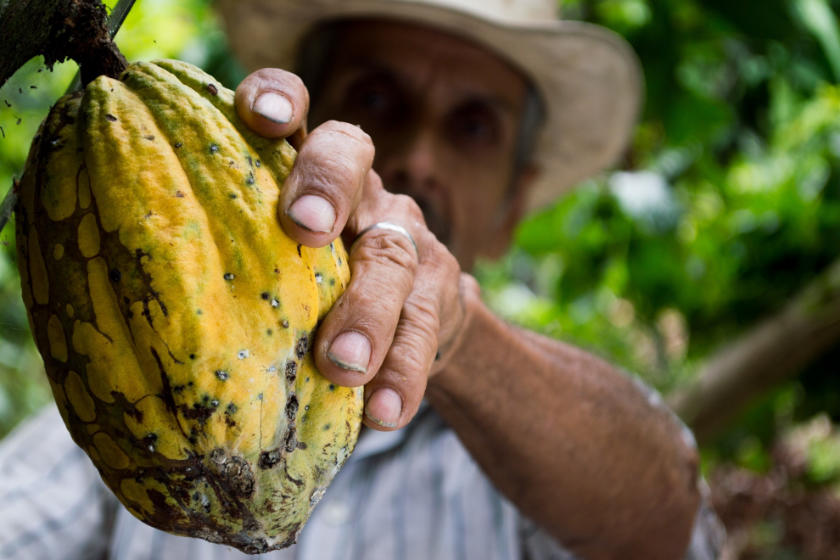
From Minca you can hike to the Cerro Kennedy mountain peak in the Sierra Nevada de Santa Marta which offers some of the most incredible views of the area. If you don’t want to hike, you can also go by moto taxi. Cerro Kennedy is definitely one of Santa Marta’s hidden treasures and a must-see place! View pictures and read more about the hike to Cerro Kennedy.

Photo by Nicole (Travelhapp), sunrise at Cerro Kennedy
The Sierra Nevada de Santa Marta is home to several indigenous groups who live very connected to nature, including the Kogui and Wiwa. In times of climate change and a likely impending collapse of capitalism, learning from those groups is not only interesting but vital. You can visit these communities with a local tour guide.
A tour to the Kogui people* with great ratings, which is carried out by a local community tourism provider, can be booked online on Viator.
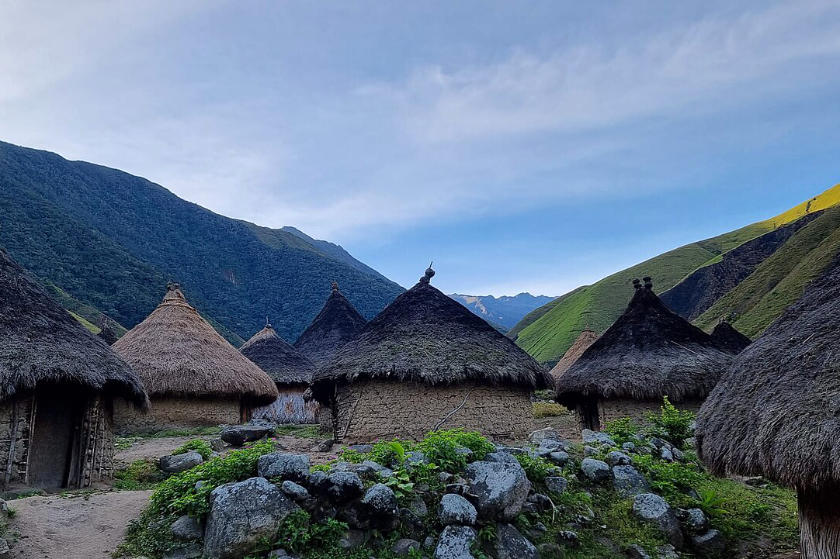
Photo by Luis Bolaño Nolavita (CC BY-SA-4.0), Kogui village Sierra Nevada de Santa Marta (mod.)
Thermal baths are probably the last things you would expect to find in Santa Marta. However, the Termales El Volcan (Google Maps) close to Cienaga, feature an extraordinarily beautiful natural setting. Consider a visit in the early morning or late afternoon to enjoy the warm waters and lush green surroundings. Before or afterwards you can refresh yourself in the sea at Costa Verde (Google Maps). The easiest way to reach the El Volcan Thermal Baths is by moto taxi.
<p>Thanks to the Netflix series One Hundred Years of Solitude, more and more travelers are becoming interested in places in Colombia connected to the novel, the show, or to Nobel Prize-winning author Gabriel García Márquez in general. (Check out my Gabo Itinerary!)</p>
<p>Among the places that inspired “Macondo” are Aracataca and the magical colonial town of Ciénaga. Aracataca is where “Gabo” was born – there, you can visit his grandparents’ house, where he lived until the age of nine.</p>
<p>Aracataca is just an hour from Santa Marta, and Ciénaga is about 45 minutes away. There are day tours from Santa Marta to Aracataca (Viator.com*), but the price depends on the group size and can be a bit high if you’re traveling solo. However, if you manage to get together a small group, a tour is a great option.<p>
You can find several amazing Yoga Retreats close to Santa Marta, nestled in the stunning natural scenery of the Sierra Nevada. Check out Gambhira Eco Yoga Village (Google Maps), Goloka Eco Village (Google Maps) and Los Vedas Spa Campestre (Google Maps). Getting a relaxing massage at Los Vedas Spa in Massinga is a nice way to end the day after the Paso del Mango hike. They occasionally offer curative Temazcal experiences (Wikipedia), based on ancestral indigenous traditions.
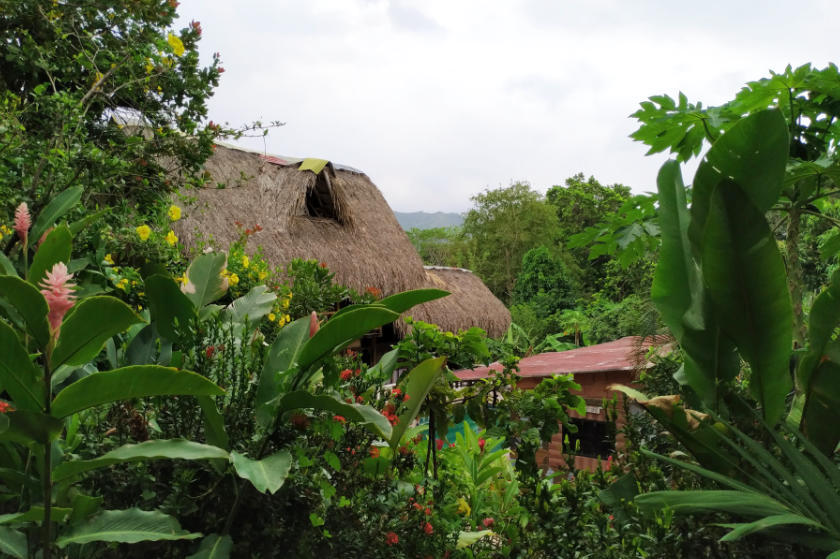
Photo by Nicole (Travelhapp): Los Vedas Spa, Massinga
There’s really so much to do around Santa Marta! I’ve added some tour recommendations in the tips above. Here are even more exciting activities offered by dedicated and highly qualified local tour agencies and guides through my affiliate partners.
Here are some suggestions of best places to stay in Santa Marta.
Historic Center: If you want to stay between beautiful colonial buildings and close to the sights, restaurant and bars, the centro historico of Santa Marta is your best choice.
Taganga: Taganga can be reached in 10-15 minutes by bus from Santa Marta. The idyllic fishing village can turn into quite a popular backpacker and party destination in certain moments of the year, however if you stay at the edges of the village in low season you can have a relaxed experience.
What about El Rodadero? El Rodadero is Colombian families’ favorite place to stay in Santa Marta with lots of beachfront hotels. We wouldn’t really recommend it to solo travelers, since it’s about 20 minutes away from the historic center of Santa Marta (by bus).
The selection of hotels and hostels in Santa Marta is large. Based on my local knowledge, I have put together a few recommendations here.
You can find upscale and luxury hotels in Santa Marta starting from around 90 USD per night (up to around USD 200).
You can get very good mid-range hotels starting from around 50 USD per night.
In Santa Marta and Taganga you can find good private rooms with a bathroom for under 40 USD per night. Dormitories are cheaper.
It’s easy to travel in and around Santa Marta as a solo traveler. Transport and accommodation are very affordable and there is an incredible amount of things to do and see in and near Santa Marta.
Is Santa Marta safe for solo travelers? Santa Marta is generally considered safe to visit but it is always recommendable to apply some basic safety guidelines when traveling alone. Please have a look at my Safety Tips for Solo Travelers and Colombia Solo Travel Guide.
I have been to Santa Marta as a solo female traveler several times since 2011 and always enjoyed my time. In fact, Santa Marta is one of my favorite cities in Colombia. You do get a little more attention as a woman compared to Colombia’s Andean cities, though. (For me personally this is not a big issue since I learned to ignore it in 6 years living in Rome…)
When it comes to hikes and treks, in Colombia it’s mostly better to go in a group (and, depending on the specific destination, with a local guide).
Santa Marta is hot throughout the year with a pleasant and sometimes crazy breeze between December and February (known as the “brisa loca”). Average day temperatures range approximately from 30 to 32°C (86-90°F), and average night temperatures from 23-25°C (73-77°F). The driest months in Santa Marta are December to March. If you travel in months with more rain, the hills around Taganga will turn beautifully green.
As with all major tourist destinations in Colombia, I would recommend to avoid the main Colombian holiday seasons and bank holidays, as it can get crowded. Also check the closing periods of Tayrona National Park, if that’s on your bucket list.
You can easily get from Santa Marta to other interesting travel destinations in Colombia overland. Head North if you want to explore off-the-beaten-track Colombia, head South to get to get to some of Colombia’s top travel destinations.
When you go North from Santa Marta you will eventually arrive at the fascinating La Guajira Peninsula.
Palomino (1,5h): Palomino is spectacularly set between the jungle and the Caribbean sea. In the recent years this small village has become a backpacker’s favorite and you will find a lot of foreign-run hostels and restaurants by the sea. However, if you cross the main road and move towards the mountains, you’ll find a more authentic and local Palomino. Palomino is a great base for exploring the nearby area which is fantastic for nature and outdoor activities. Just take the bus towards Riohacha from Plaza de Mercado in Santa Marta and you’ll reach Palomino in approximately 1,5 hours.
Riohacha (3h): The capital of La Guajira, laid-back Riohacha, makes a pleasant stay with its little houses and colonial center. It’s a great base for exploring nearby attractions, like the Flamingo Beach in Camarones or the otherworldly Cabo de la Vela desert and Punto Gallinas in the very North of Colombia. The bus from Santa Marta to Riohacha takes around 3 hours. Try to get a window seat because the scenery along the way is simply amazing. Discover the best things to do in Riohacha and La Guajira.
You can head South from Santa Marta along the Caribbean coast to get to Cartagena, or inlands to get to Bucaramanga.
Cartagena (4,5h): The most common next stop after Santa Marta is Caribbean jewel Cartagena. It’s a 4-5 hour bus ride from Santa Marta (see details on Rome2Rio). Check out interesting things to do in and near Cartagena.
Barranquilla (2h): Barranquilla is a worthwhile stop on your way to Cartagena to get a great local experience of Colombian music and dance culture and stroll along the beautiful Malecón by the Magdalena River. Here are some tips on what to do in Barranquilla. Consider a stop over at the Ciénaga Grande with its stilt houses on your way from Santa Marta to Barranquilla.
Bucaramanga (10h): In about 10 hours by bus you get from Santa Marta to outdoor and adventure paradise Bucaramanga. Read our recommendations on things to do in and near Bucaramanga.
Share this post:
Last Update: November 17, 2025
Image credits: Santa Marta title image (top) by Oscar Ivan Esquivel Arteaga (mod.)
© 2026 Travelhapp.com
To provide the best experiences, we use technologies like cookies to store and/or access device information. Consenting to these technologies will allow us to process data such as browsing behavior or unique IDs on this site. Not consenting or withdrawing consent, may adversely affect certain features and functions. View our Privacy & Cookie Policy